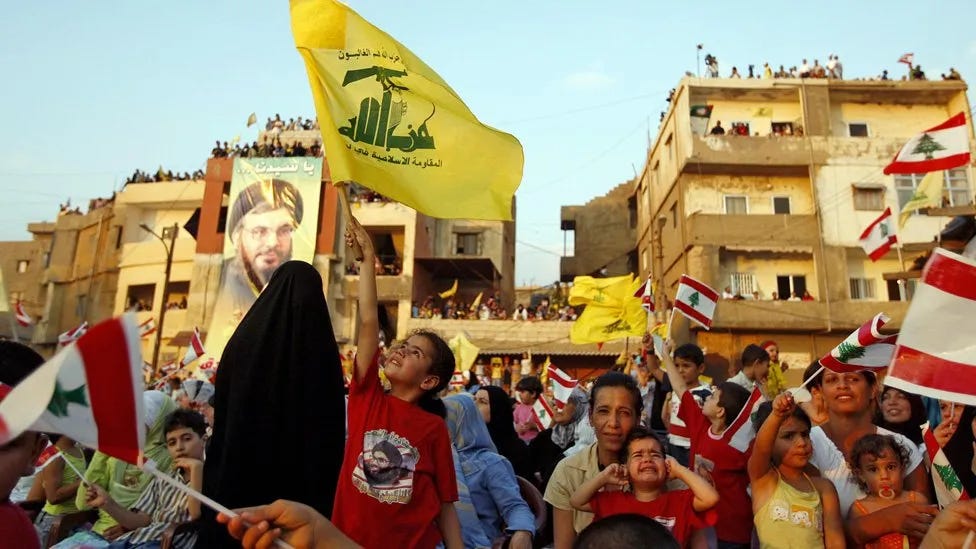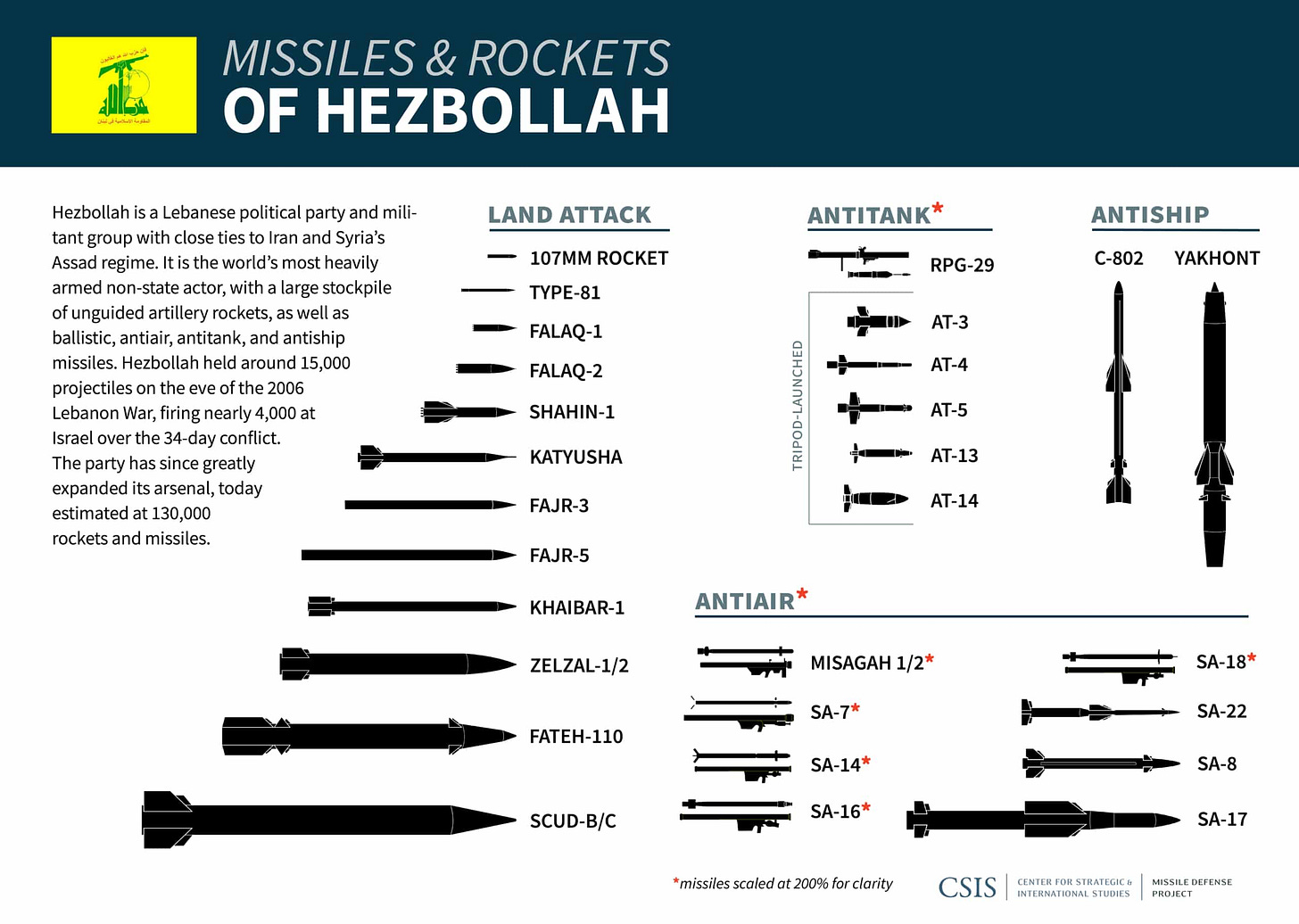Israel-Hezbollah Tensions Could Signal Broad Regional War
The threat of an all-out war between Israel and Hezbollah appears increasingly likely. The costs could be high for all involved and the world at large.
Smoke rises from the Lebanese town of Khiam amid cross-border hostilities between Israel and Hezbollah. Image source
Over the past week, the Israeli Defence Forces (IDF) conducted a series of military exercises simulating war in neighboring Lebanon. Israeli Prime Minister Benjamin Netanyahu and IDF Chief of Staff Lieutenant General Herzi Halevi personally oversaw the exercises on June 25 and 26. These preparations come amid an escalation in cross-border strikes between Israel and the Lebanon-based Islamist militant group Hezbollah. While both sides have been engaging in near-daily clashes since October 2023, the severity of fighting has increased in recent weeks. Nearly one hundred Lebanese civilians have been killed, with over 60,000 Israelis and 94,000 Lebanese displaced to date.
With a war between Israel and Iran-backed Hezbollah increasingly likely, several countries have asked their citizens to leave Lebanon, and Washington is now calling for diplomacy between the two sides amid the growing threat of regional escalation.
Basis for escalation
Israel appears intent on dealing a significant blow to Hezbollah’s capability as a matter of restoring deterrence. Since last October, Israel has launched thousands of cross-border attacks on Hezbollah. Still, these have done little to deter the organization, which continues to step up its attacks into northern Israel using armed drones and surface-to-air missiles. The city of Kiryat Shimona near the border has been a favored Hezbollah target, especially since January.
These Hezbollah attacks have placed an unpopular Israeli government under pressure to respond and are a significant driver of its increasingly bellicose rhetoric in recent weeks. On June 27, Israeli Defense Minister Yoav Gallant warned that the IDF is capable of taking Lebanon “back to the stone age.” A war with Hezbollah also offers Israeli Prime Minister Benjamin Netanyahu a way to garner public support amid a crisis of confidence in his leadership, including within his former war cabinet, over his handling of the war in Gaza. According to a survey by the Jewish People Policy Institute, 62% of Jewish Israelis support a “full force” attack on Hezbollah.
Hezbollah has mostly matched Israel’s rhetoric. On June 19, the group threatened the Israeli port of Haifa and warned that it would strike Cyprus for aiding Israel’s war effort. Hezbollah leader Hassan Nasrallah claimed that the group was rejecting offers from armed entities willing to send foot soldiers to combat Israel since it is “overwhelmed by the numbers” it already has. Hezbollah currently commands support from a range of Iranian proxies in the Middle East, such as the Popular Mobilization Forces in Iraq.
In Lebanon, much of the country has little appetite for another war with Israel, especially amid the country’s dire economic situation. A patchwork of religious and ethnic groups comprise Lebanese society, including Sunni and Shia Muslims, Maronite Catholic, Greek Orthodox, and other Christian groups, Druze, Palestinian refugees, and more. Following a brutal civil war between these ethnic factions that lasted between 1975 and 1990, most of these groups have little interest in further bloodshed, nor do they share Hezbollah’s enmity toward Israel. For example, Maronite Catholic community leaders advocate for Lebanon’s neutrality, and interviews with members of the Marjayoun Christian community interviewed by international media claim that Gaza is not their war, indicating their opposition to Hezbollah’s stance.
Lebanon’s ethnic groups have historically maintained militias to protect their communities. While these are largely a legacy of past conflicts, the remnants of such militias remain at the forefront of sectarian tensions in today’s Lebanon. Still, these forces are unlikely to play a significant role in a potential war between Israel and Hezbollah, given the lack of support within their communities. However, should war ensue, anger against Hezbollah could result in increased sectarian strife, which has been building up in recent years with local Christian far-right groups, such as Soldiers of God, firmly opposed to Hezbollah’s engagement with Israel.
Hezbollah also appears to lack an appetite for war. The 2006 Israel-Lebanon conflict resulted in high costs for the group; indeed, Nasrallah admitted in 2009 that he regretted the kidnapping of two Israeli soldiers that sparked the war. This regret is partly why the group has been careful to avoid rapid escalation, instead engaging in tit-for-tat attacks and Israel inflicting much heavier casualties in the process. The potential wholesale degradation of Hezbollah would also deal a significant blow to Iran’s regional standing.
Hezbollah survived Israel’s 2006 war and is now much stronger than ever before. Image source
Challenges and setbacks
A war between Israel and Hezbollah appears increasingly likely. Earlier this month, the IDF “approved and validated” plans for an offensive in Lebanon, and Israel seems to be establishing the basis for initiating a cross-border invasion. A British newspaper recently ran a story citing whistleblowers claiming that Hezbollah was importing and storing Iranian weapons at the Beirut–Rafic Hariri International Airport. However, Lebanese authorities denied this claim and invited the press and foreign diplomats to tour the facility. It is possible that the supposed leaks came from Israel-linked sources seeking to make the airport a legitimate target in the event of a war.
Any confrontation could come in the form of a limited conflict or an all-out war, with each option guided by different considerations. A limited conflict offers Israel a chance to potentially degrade Hezbollah with daily strikes while avoiding another ground war before completing its military and political objectives in Gaza and limiting casualties amid suspicions of morale problems within the IDF. Should Israel decide to engage Hezbollah in an all-out war, it would likely begin with the large-scale aerial bombardment of suspected Hezbollah targets in southern and central Lebanon, particularly Sidon, the Bekaa Valley, southern Beirut, and south of the Litani River. However, the latter option presents significant challenges as Hezbollah’s capacity to wage war has expanded dramatically since Israel’s 2006 operations.
Hezbollah has established concealed sites across southern Lebanon to facilitate rocket and anti-tank guided missile attacks against northern Israel, in violation of UN Security Council Resolution 1701. Therefore, it is likely that Israel would seek to strike these to push Hezbollah back across the Litani River before launching a ground operation to further secure the safety of its citizens living in the border areas. Deploying infantry and mechanized forces, even at a later stage, will pose significant challenges in the event, given the IDF’s regular and reserve elements are stretched thin following nine months of combat in Gaza.
Should Israel engage Hezbollah in an all-out war, the result could be catastrophic for both sides. When faced with an existential threat, Hezbollah will likely respond with coordinated rounds of rocket, missile, and drone strikes in several key locations, including north of Haifa and Golan in the east. The group has formidable strike capabilities. Previous issues of Between the Lines have covered this extensively, including its suspected arsenal of as many as 200,000 missiles. US officials claim Hezbollah can launch 3,000 missiles per day, likely enough to overwhelm at least some of Israel’s air defenses, resulting in significant civilian casualties and damage to critical infrastructure. A war on such a scale could also provoke direct Iranian involvement.
Hezbollah maintains an extensive arsenal of rockets and missiles. Image source
Conclusion
The Middle East is on the cusp of yet another conflict as tensions between Israel and Hezbollah continue to mount. This time, the stakes are much higher given the size of Hezbollah’s firepower and potentially that of Iran and its other proxies. In this way, this potential war can escalate to a broad regional conflict with global consequences.






